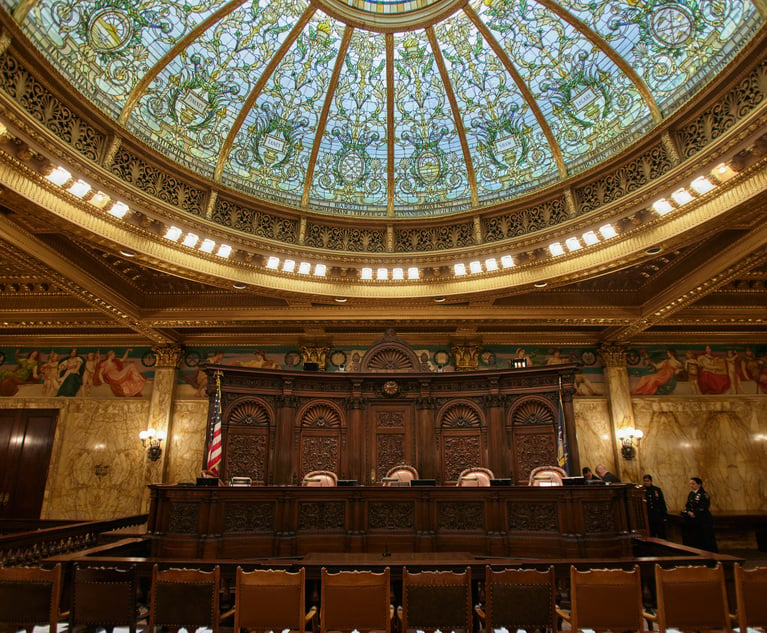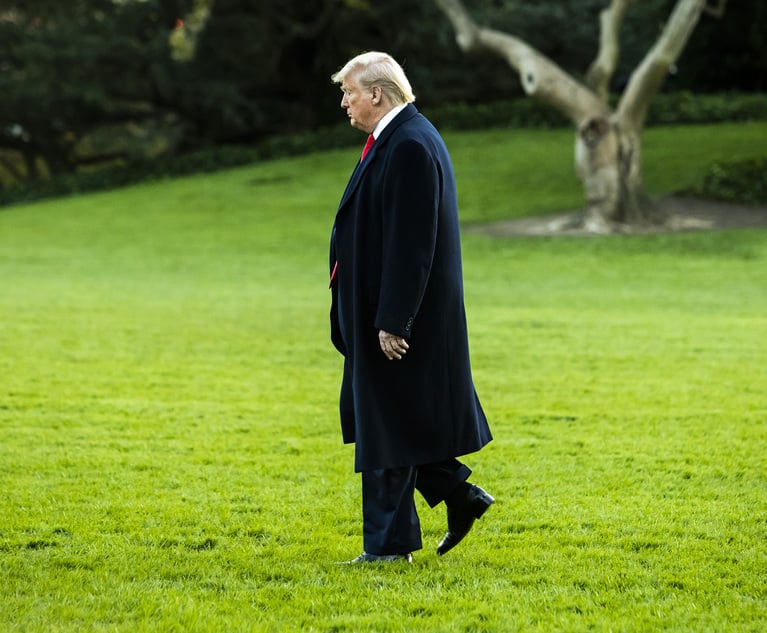Permissibility of Offsetting Criminal Forfeiture Orders by Preemptive Restitution Payments
In their Second Circuit Review, Martin Flumenbaum and Brad S. Karp discuss the circuit's recent decision in 'United States v. Bodouva', which addressed whether restitution offsets could be used to lower, or even eliminate, criminal forfeiture orders.
July 01, 2017 at 12:00 AM
6 minute read
If a defendant facing an embezzlement charge repays her victims in full prior to trial, can a district court reduce that defendant's criminal forfeiture debt by the amount repaid to her victims? At first glance, one might reasonably assume that such an “offset” would be permissible: after all, the victims have been made whole and the defendant has repaid the losses suffered as a result of her conduct. The imposition of a criminal forfeiture order on top of the restitution already paid by the defendant, moreover, would effectively force the defendant to pay twice for the same crime. But do district courts have the statutory authority to allow for such an offset? The U.S. Court of Appeals for the Second Circuit recently addressed whether such restitution offsets could be used to lower, or even eliminate, criminal forfeiture orders. In a per curiam decision issued by a panel comprised of Judges Robert Katzmann, Rosemary Pooler and Gerard Lynch in United States v. Bodouva, the court held that, absent explicit statutory authority allowing judges to lower criminal forfeiture amounts by the amount of any restitutive payments already made, a district court does not possess the authority to allow an offset under current law.
Background and Lower Court
On March 16, 2016, Christine Bodouva, the former chief operating officer of her father's Manhattan-based architectural design firm, William N. Bodouva & Associates, was indicted on one count of embezzling funds from the firm's pension benefit fund, in violation of the Employee Retirement Income Security Act (ERISA). United States v. Bodouva, 853 F.3d 76, 78 (2d Cir. 2017). This indictment contained a forfeiture allegation directing that Bodouva “forfeit to the United States … any property, real and personal, that constitutes or is derived from proceeds traceable to the commission of the offense alleged in” the indictment. Id. On April 8, 2016, after her indictment but prior to her trial, Bodouva paid $126,979.63 to the firm's pension benefit fund. Id.
Following a jury trial before Judge Valerie E. Caproni, Bodouva was found guilty of embezzlement. United States v. Bodouva, 16-CR-214 (VEC), 2016 WL 7351634, *1 (S.D.N.Y. Dec. 16, 2016). The jury found that, from 2012 until 2013, Bodouva had embezzled approximately $125,000 in 401(k) contributions that were withheld from employees' paychecks, but then not deposited back into the firm's 401(k) plan. Id. The evidence of Bodouva's guilt, according to the district court, was “overwhelming.” Id. For instance, the government established that Bodouva had used the misappropriated funds for personal expenses, including, among other things, paying off her credit cards and purchasing memberships to a golf club and a yacht club. Id. The firm's bookkeeper also testified that, during the time period in question, Bodouva had refused to approve remitting employees' 401(k) contributions to the firm's plan. Id. Finally, the 401(k) plan administrator testified that, between 2012 and 2013, he had sent Bodouva “at least ten letters warning her that failure to make required remittances to the [f]und” would violate ERISA. Id.
At sentencing, Bodouva urged the district court to reduce the amount of forfeiture imposed on her by the amount that she had voluntarily paid back to the firm's 401(k) plan. 853 F.3d at 78. Although the government opposed Bodouva's request for such a reduction, it conceded that the Second Circuit had yet to decide whether criminal forfeiture orders could be “offset” by a defendant's preemptive restitutive payments. Id. The district court nonetheless concluded that she had no discretion to apply any such offset and entered the forfeiture order against Bodouva in the full amount sought by the government. 2016 WL 7351634, at *6. In denying Bodouva's subsequent motion to stay the forfeiture order, the district court held that forfeiture and restitution actions “serve different purposes,” with forfeiture acting as the government's punitive response to potentially criminal behavior and restitution attempting to remediate a particular loss. Id. Because these two actions serve two different purposes, the district court stressed that forfeiture was not “impermissibly duplicative” of restitution. Id. Citing authority from the Third and Seventh Circuits, moreover, the court suggested that the government would not receive a “windfall” from Bodouva's payment of both restitution and forfeiture, see United States v. Emerson, 128 F.3d 557, 567 (7th Cir. 1997), and that, given the “many tangible and intangible costs of criminal activity,” having Bodouva pay as much as “twice the value of the proceeds of the crime” would not amount to an inherently unjust punishment. See United States v. Various Computers & Computer Equip., 82 F.3d 582, 588 (3d Cir. 1996). In its final footnote, the district court noted that because Bodouva's case involves the forfeiture of cash, and not “unique” property with “intrinsic value,” Bodouva could still “be made whole by the return of the cash forfeited.” 2016 WL 7351634, at *6 n.4.
Second Circuit Decision
On appeal, the Second Circuit summarily affirmed the district court's ruling. 853 F.3d at 77. First, the court indicated that forfeiture and restitution are “creations of distinct statutes,” and that Bodouva could not point to any statutory language that connected the two concepts, let alone one that even implied a potential offset of one against the other. See id. at 78. Second, the court echoed the district court's contention that the different purposes behind forfeiture and restitution undermined Bodouva's contention that the imposition of both orders would amount to an “unfair double disgorgement.” Id. at 79. The court noted that both the Ninth and Eleventh Circuits had “reached the same conclusion on similar grounds.” Id. Finally, the court rejected Bodouva's claim that the district court had the discretion to apply a restitution-based offset against a forfeiture order under 18 U.S.C. §981(a)(2)(B), a section of the forfeiture statute. Id. Under this section, Congress provided for reductions in forfeiture amounts only under certain circumstances, including cases involving “lawful goods or … services … sold or provided in an illegal manner” or “fraud in the process of obtaining a loan or extension of credit.” Id. at 79-80 (internal citation omitted). The forfeiture statute did not, however, allow for the offset of funds earned as a result of an “inherently unlawful activities.” Id. at 80 (internal citations omitted). The court held that Bodouva's embezzlement qualified as an “inherently unlawful activity.” Id. Thus, the court held that Bodouva did not qualify for any reduction under the forfeiture statute.
Conclusion
In Bodouva, the Second Circuit followed its sister circuits in deciding that preemptive restitutive payments may not be used to offset criminal forfeiture orders if these payments were earned as a result of inherently unlawful activities, such as embezzlement. This court's holding suggests that, with some narrow exceptions, clients should be counseled against the pre-payment of restitution fees in the hope of a forfeiture offset.
This content has been archived. It is available through our partners, LexisNexis® and Bloomberg Law.
To view this content, please continue to their sites.
Not a Lexis Subscriber?
Subscribe Now
Not a Bloomberg Law Subscriber?
Subscribe Now
NOT FOR REPRINT
© 2025 ALM Global, LLC, All Rights Reserved. Request academic re-use from www.copyright.com. All other uses, submit a request to [email protected]. For more information visit Asset & Logo Licensing.
You Might Like
View All
Decision of the Day: Trial Court's Sidestep of 'Batson' Deprived Defendant of Challenge to Jury Discrimination

President Trump Hires Sullivan & Cromwell to Handle Manhattan Criminal Appeal


Trending Stories
- 1States Accuse Trump of Thwarting Court's Funding Restoration Order
- 2Microsoft Becomes Latest Tech Company to Face Claims of Stealing Marketing Commissions From Influencers
- 3Coral Gables Attorney Busted for Stalking Lawyer
- 4Trump's DOJ Delays Releasing Jan. 6 FBI Agents List Under Consent Order
- 5Securities Report Says That 2024 Settlements Passed a Total of $5.2B
Who Got The Work
J. Brugh Lower of Gibbons has entered an appearance for industrial equipment supplier Devco Corporation in a pending trademark infringement lawsuit. The suit, accusing the defendant of selling knock-off Graco products, was filed Dec. 18 in New Jersey District Court by Rivkin Radler on behalf of Graco Inc. and Graco Minnesota. The case, assigned to U.S. District Judge Zahid N. Quraishi, is 3:24-cv-11294, Graco Inc. et al v. Devco Corporation.
Who Got The Work
Rebecca Maller-Stein and Kent A. Yalowitz of Arnold & Porter Kaye Scholer have entered their appearances for Hanaco Venture Capital and its executives, Lior Prosor and David Frankel, in a pending securities lawsuit. The action, filed on Dec. 24 in New York Southern District Court by Zell, Aron & Co. on behalf of Goldeneye Advisors, accuses the defendants of negligently and fraudulently managing the plaintiff's $1 million investment. The case, assigned to U.S. District Judge Vernon S. Broderick, is 1:24-cv-09918, Goldeneye Advisors, LLC v. Hanaco Venture Capital, Ltd. et al.
Who Got The Work
Attorneys from A&O Shearman has stepped in as defense counsel for Toronto-Dominion Bank and other defendants in a pending securities class action. The suit, filed Dec. 11 in New York Southern District Court by Bleichmar Fonti & Auld, accuses the defendants of concealing the bank's 'pervasive' deficiencies in regards to its compliance with the Bank Secrecy Act and the quality of its anti-money laundering controls. The case, assigned to U.S. District Judge Arun Subramanian, is 1:24-cv-09445, Gonzalez v. The Toronto-Dominion Bank et al.
Who Got The Work
Crown Castle International, a Pennsylvania company providing shared communications infrastructure, has turned to Luke D. Wolf of Gordon Rees Scully Mansukhani to fend off a pending breach-of-contract lawsuit. The court action, filed Nov. 25 in Michigan Eastern District Court by Hooper Hathaway PC on behalf of The Town Residences LLC, accuses Crown Castle of failing to transfer approximately $30,000 in utility payments from T-Mobile in breach of a roof-top lease and assignment agreement. The case, assigned to U.S. District Judge Susan K. Declercq, is 2:24-cv-13131, The Town Residences LLC v. T-Mobile US, Inc. et al.
Who Got The Work
Wilfred P. Coronato and Daniel M. Schwartz of McCarter & English have stepped in as defense counsel to Electrolux Home Products Inc. in a pending product liability lawsuit. The court action, filed Nov. 26 in New York Eastern District Court by Poulos Lopiccolo PC and Nagel Rice LLP on behalf of David Stern, alleges that the defendant's refrigerators’ drawers and shelving repeatedly break and fall apart within months after purchase. The case, assigned to U.S. District Judge Joan M. Azrack, is 2:24-cv-08204, Stern v. Electrolux Home Products, Inc.
Featured Firms
Law Offices of Gary Martin Hays & Associates, P.C.
(470) 294-1674
Law Offices of Mark E. Salomone
(857) 444-6468
Smith & Hassler
(713) 739-1250






